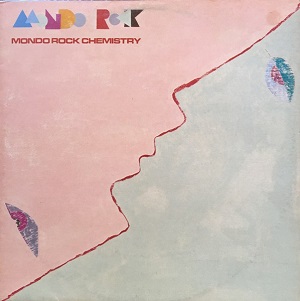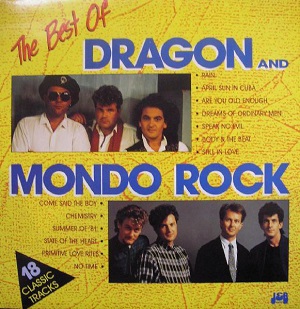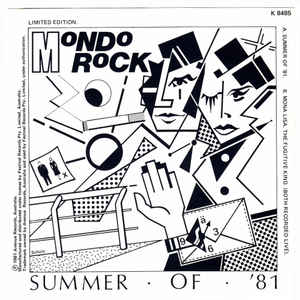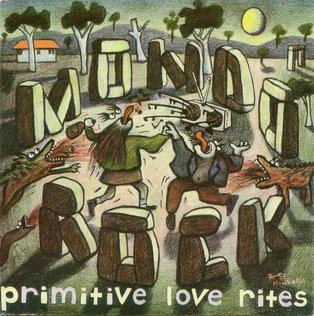Pat Wilson is an Australian singer and journalist. Wilson wrote for Go-Set, a 1960s and 1970s pop music newspaper, under the pen-name "Mummy Cool" during 1971–1972. Wilson released several singles in the early 1980s including the hit single "Bop Girl". The song was written by her then husband Ross Wilson of the bands Daddy Cool and Mondo Rock.

Ross Andrew Wilson is an Australian singer-songwriter, musician and producer. He is the co-founder and frontman of the long-standing rock groups Daddy Cool and Mondo Rock, as well as a number of other former bands, in addition to performing solo. He has produced records for bands such as Skyhooks and Jo Jo Zep & the Falcons, as well as for those of his own bands. He appeared as a judge on celebrity singing TV series It Takes Two from 2005. Wilson was individually inducted into the Australian Recording Industry Association (ARIA) Hall of Fame in 1989 and again as a member of Daddy Cool in 2006.
The Captain Matchbox Whoopee Band, also known as Soapbox Circus or Matchbox, were an Australian jug band formed in 1969. It centred on Mic Conway on lead vocals, washboard and ukulele; and his brother, Jim Conway, on harmonica, kazoo and vocals. They issued four studio albums, Smoke Dreams, Wangaratta Wahine, Australia and Slightly Troppo (1978), before they disbanded in September 1980. The Conway brothers reformed the group in 2010 as Captain Matchbox Reignited and disbanded again two years later.
Mondo Rock were an Australian rock band formed in November 1976 by singer-songwriter, Ross Wilson. Guitarist Eric McCusker, who joined in 1980, wrote many of the band's hits, and along with Wilson formed the core of the group. They're best known for their second album, Chemistry which was released in July 1981 and peaked at number 2 on the Australian Kent Music Report. Their song "Come Said the Boy" peaked at number 2 in Australia in 1983.

"State of the Heart" is a song recorded by Australian rock group Mondo Rock and released in October 1980 as the lead single from the band's second studio album, Chemistry (1981). The song peaked at number 6 on the Australian Kent Music Report. The song was written by Mondo Rock's guitarist Eric McCusker.

Whispering Jack is the twelfth studio album by Australian adult contemporary pop singer John Farnham. It was produced by Ross Fraser, and released on 20 October 1986, peaking at #1 on the Australian Kent Music Report Album Charts. Whispering Jack has become the second best-selling-album in Australia, behind Meatloaf's album Bat Out of Hell, and the highest selling album in Australia by an Australian artist - 24x platinum indicating sales of over 1.68 million copies sold. It spent 25 weeks at the No. 1 spot on the Album Charts during 1986–1987, it was awarded the 1987 ARIA Award for "Album of the Year", and was the best charting album for the decade of the 1980s in Australia. It was the first Australian-made album to be released on Compact Disc within Australia. One of Farnham's biggest hits, "You're the Voice" was issued as the lead single from this album and peaked at No. 1 on the Kent Music Report Singles Charts.

Chemistry is the second studio album by Australian rock band Mondo Rock, produced by Mark Moffat, and released in July 1981. It was released in the US in January 1982 on Atlantic Records. The album was certified 2x Platinum in Australia.

The Modern Bop is the fourth studio album by Australian rock band Mondo Rock, released in March 1984 and peaked at number 5 on the Kent Music Report.

Nuovo Mondo is the third studio album by Australian rock band Mondo Rock, released in July 1982. It was released through WEA Records and reached number 7 on the Kent Music Report.

The Best of Dragon and Mondo Rock is a collaborative compilation album by Australian rock band Mondo Rock and New Zealand band Dragon, released in June 1990. The album peaked at number 47 on the ARIA Charts.

Boom Baby Boom is the fifth studio album by Australian rock band Mondo Rock, released in September 1986. It peaked at number 27 on the Kent Music Report.

Aliens is the first EP by Australian rock band Mondo Rock. It was released in 1987. It peaked at number 66 on the Kent Music Report.

"Summer of '81" is a song by Australian rock band Mondo Rock, released in October 1981. It is the fourth and final single to be released from the band's second studio album Chemistry (1981). It peaked at number 31 on the Kent Music Report.

"The Fugitive Kind" is the debut single by Australian rock band Mondo Rock, released in September 1978. It peaked at number 49 on the Kent Music Report. The song appears as a bonus track for Mondo Rock's debut studio album Primal Park.
"Chemistry" is a song by Australian rock band Mondo Rock, released in July 1981 as the third single from the band's second studio album Chemistry (1981). The song peaked at number 20 on the Kent Music Report.

"The Queen and Me" is a song by Australian rock band Mondo Rock, released in September 1982 as the second single from the band's third studio album Nuovo Mondo (1982). It peaked at number 40 on the Kent Music Report.

"Come Said the Boy" is a song by Australian rock band Mondo Rock, released in November 1983 as the lead single from the band's fourth studio album The Modern Bop (1984). The song became the band's highest-charting single, peaking at number 2 on the Kent Music Report. It was written by the group's lead guitarist, Eric McCusker, and was co-produced by John Sayers and the band.

"Primitive Love Rites" is a song by Australian rock band Mondo Rock, released in October 1986 as the second single from the band's fifth studio album Boom Baby Boom (1986). The song peaked at number 34 on the Kent Music Report. The song became the band's only song to peak within the Billboard Hot 100, at 71. In New Zealand the song peaked at number 40 on Recorded Music NZ.

The Essential Mondo Rock is a 2 disc compilation album by Australian rock band Mondo Rock, released in October 2003 by Sony Music Australia. It peaked at number 70 on the ARIA Charts in November 2003.

Rule of Threes is the seventeen single by Australian band Mondo Rock, released in 1986. It was released as a first single from Mondo Rock's fifth studio album Boom Baby Boom. The song reached at number 58 on the Kent Music Report. The song was written by Mondo Rock's guitarist Eric McCusker.
















